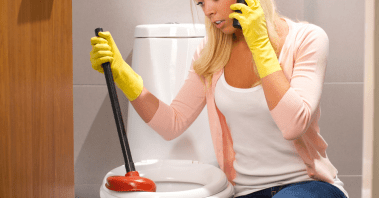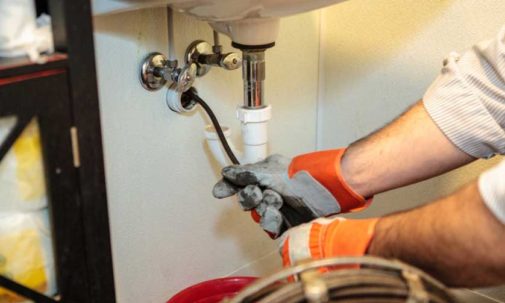What are your thoughts with regards to What to Do While Waiting for an Emergency Plumber?

Pipes emergencies can strike at any moment, triggering stress and anxiety and possible damage to your home. Whether it's a burst pipeline, a clogged drain, or a leaking tap, recognizing how to manage the circumstance till a professional plumbing shows up can save you from further issues. This post gives important emergency plumbing ideas to aid you minimize damages and regain control during a plumbing dilemma.
Shut off the Water System
The very first step in any kind of plumbing emergency is to shut off the supply of water. For localized problems, such as a dripping tap or commode, switch off the shutoff near the component. When it comes to a significant leak or burst pipe, locate your home's main water shut-off valve and turn it off instantly. Knowing the location of these valves beforehand can save important time during an emergency.
Address Small Leaks with Short-term Fixes
Small leaks can quickly become significant troubles if left uncontrolled. Make use of these short-lived solutions till specialist aid shows up:
While these solutions aren't long-term, they can assist minimize water loss and damage.
Unclog Drains Pipes Securely
A blocked drain can be an irritating and unpleasant problem. Here's how to tackle it:
If these techniques don't work, stay clear of utilizing extreme force, as it might aggravate the blockage.
Take Care Of Overflowing Toilets
An overflowing toilet can cause prompt disorder. Below's what you must do:
Shut down Your Hot Water Heater
In specific emergencies, such as a ruptured pipe, it's a good idea to shut down your hot water heater. This avoids overheating or damages to the system when water stops moving. Shut off the power supply to the hot water heater (electric or gas) and allow it cool off to avoid possible risks.
Temporarily Quit a Burst Pipeline
A ruptured pipe can bring about considerable water damage in mins. To mitigate the concern:
Call a professional plumbing professional promptly to deal with the problem completely.
Deal With Frozen Piping Thoroughly
In colder environments, frozen pipelines are a typical emergency situation. If you presume a frozen pipeline:
Protect against Further Damages
Taking fast action to reduce damages can save you time and money in the future. Below's how:
. Have an Emergency Pipes Package
Prepare a standard plumbing emergency set to manage small issues efficiently. Your kit ought to consist of:
Having these devices accessible can make a substantial difference in your ability to manage emergencies.
Know When to Call an Expert.
While quick fixes can assist momentarily, specific pipes problems need instant expert attention. Call a plumbing if:.
Immediately calling a professional ensures the concern is solved properly and avoids more issues.
Final thought.
Plumbing emergency situations can be frustrating, however with the appropriate understanding and tools, you can manage the situation properly till aid shows up. By shutting off the supply of water, addressing tiny leakages, and utilizing short-term fixes, you can minimize damages and maintain your home safe. Keep in mind, these tips are temporary services; always get in touch with a qualified plumbing technician to deal with the root cause of the trouble. Prep work and quick reasoning are your finest allies in any pipes emergency situation.
8 Helpful Tips for Managing Plumbing Emergencies at Home
If your plumbing system hasn’t failed once, wait for it because almost everyone has a story to tell. Sometimes, it could be simple emergencies such as a leaking pipe, a blocked cistern, or even a big burst pipe. In situations like this, you need to have some handy tips to save you some money and from possible damages.
Take care of minor issues early.
Sometimes, you could have avoided an emergency by taking proactive measures while it was still early. Some major plumbing emergencies can be a result of an ignored minor issue. We recommend that you have items like plumbing tapes and other related items. A plumbing tape can allow you to manage minor leaks before the plumber arrives.
Cut off the water supply.
This tip is essential in almost any type of leakage problem. For problems like minor leakages in the toilet or kitchen, turn off the supply that takes water to the affected pipes. If the leakage is a major pipe, you must shut off the supply valve to the entire building. This will help you avoid flooding your home and neighbors if you share a flat.
Know your plumbing system
Folks typically move into a new apartment without understanding the water supply around the building. This can prove disastrous if a water emergency arises and the plumber is far away. The previous tip will prove useless if you don’t practice this one. More importantly, know where your water shut-off valve is located – you’ll need that knowledge to prevent potential home floods.
Have some common handy tools
There are lots of plumbing emergencies that you can handle without hiring a plumber. That’s why you must keep some tools available always. Some tools that you can use to fix simple plumbing emergencies easily include plumbing tapes, screwdrivers, thread seal tapes, plungers, pliers, tape measures, and rubber gloves.
Insulate your pipes from cold
You’ll save yourself from many plumbing expenses if you protect your water pipes from the cold. This is because of the harmful effects that cold weather can have on your pipes. During winter, your pipes can burst from being overly expected to freezing temperatures. So, make sure insulators are there to keep the pipes working correctly.
Avoid practices that will clog your toilet.
Many people indulge in practices that can damage the plumbing system of the entire building. One of these is when they use their toilet to dispose-off garbage. They flush all kinds of things, such as paper towels, bandages, hairs, female sanitary products, etc., down the toilet. This will block your toilet in the long run, incurring unnecessary expenditures. Dump such waste in the trash instead.
Check your dials regularly.
Sometimes, there could be leakages in your home without noticing them in time. So, constantly monitor your water meter dial. If the dial is reading when there is nobody using water, this is an indicator that there is leaking. Check for leaks immediately. Call a plumber as soon as possible if you can’t find any.
https://www.constructionplacements.com/8-helpful-tips-for-managing-plumbing-emergencies-at-home/

We were introduced to that editorial on Plumbing Emergencies: Tips on What To Do Before from a buddy on our other blog. Are you aware of another person who is involved in Expert Tips for Managing a Plumbing Emergency Until Help Arrives? Take a moment to promote it. Thanks a lot for taking the time to read it.
Click Here!